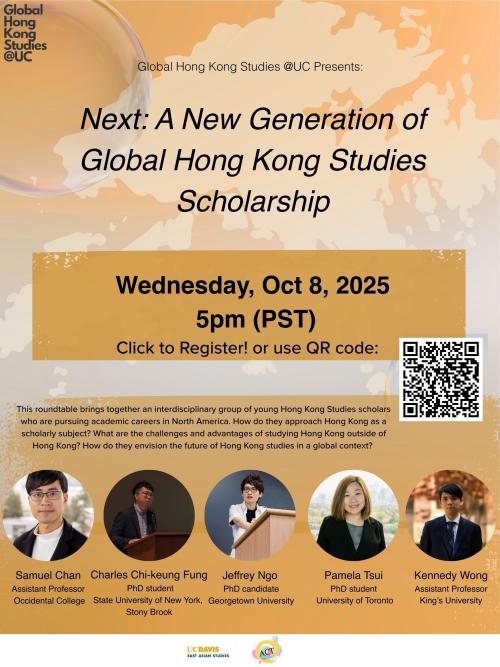
Event Date

About the Event
Next: A New Generation of Global Hong Kong Studies Scholarship
This roundtable brings together an interdisciplinary group of young Hong Kong Studies scholars who are pursuing academic careers in North America. How do they approach Hong Kong as a scholarly subject? What are the challenges and advantages of studying Hong Kong outside of Hong Kong? How do they envision the future of Hong Kong studies in a global context?
Please register here.
About the Speakers

Kai Yui Samuel Chan is an Assistant Professor in Politics at Occidental College. Having earned his PhD from UC Berkeley in Political Science with a specialization in Political Theory, his research concerns individuals and communities traversing state borders. Samuel’s current book project, Entangled Peoplehood, re-interprets self-determination in light of the challenges confronting colonized, indigenous, and exiled peoples as they navigate an existing global order of nation states. His articles on diaspora, democratic theory, and interpretivism have been published or accepted by journals including American Journal of Political Science, Political Studies, and the European Journal of Political Theory.
Chi Keung Charles Fung is a PhD student in sociology at the State University of NewYork, Stony Brook. His research interests include state (trans)formation,fiscal politics, identity-making, geopolitics, and governance, focusing on how these processes unfold in the context of imperial/colonial rule. He is the co-author of Hong Kong Public and Squatter Housing: Geopolitics and Informality, 1963–1985 (Hong Kong University Press, 2023), co-editor of A New Documentary History of Hong Kong, 1945–1997 (Hong Kong UniversityPress, 2025), and has contributed articles to journals such as Asian Perspective, Social Transformations in Chinese Societies, and East Asia.


Jeffrey C. H. Ngo is a Ph.D. candidate and instructor in history at Georgetown University who specializes in the Pacific World. His dissertation project, entitled “Thuyền Nhân: Vietnamese Refugees, the Human-Rights Regime, and Global Governance in Hong Kong,” is a new international history of the boat people — and the three Indochina Wars more generally — situated within the longue durée of Vietnam-Hong Kong connections. Having concentrated his earlier academic work on cultural history, he has since moved on to explore questions of sovereignty, law, borderlands, and immigration in relation to Hong Kong. He holds a B.A. (2016) and an M.A. (2017) from New York University; in 2017–18, he was a visiting scholar at the University of Toronto’s Richard Charles Lee Canada-Hong Kong Library.
Pamela Tsui is a PhD Candidate in Sociology at the University of Toronto. At the core of her research is a concern with how people navigate repressive forces, whether under the heteronormative regime of normalcy or the rise of authoritarianism, through creative practices in their everyday lives. Her work has appeared in Gender & Society, Sexualities, Law & Society Review, and Critical Asia Archives. She has received multiple paper awards and honors, including from the American Sociological Association and the Hong Kong Sociological Association. Her dissertation examines how Hong Kongers, both in the city and across the diaspora, reimagine money in response to the shifting political landscape of the early 2020s. Born and raised in Hong Kong, she completed her undergraduate degree in Cultural Studies at the Chinese University of Hong Kong and earned her MPhil in Social Work and Social Administration at the University of Hong Kong.

